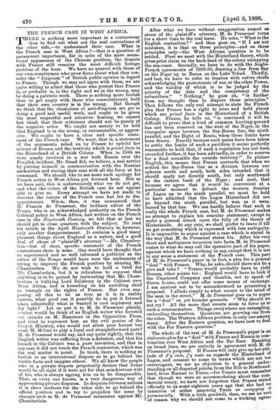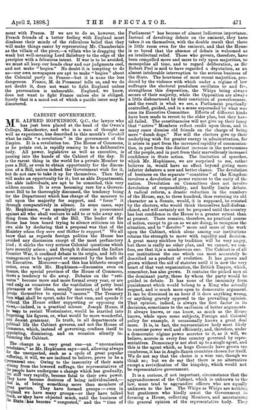THEFRENCH CASE IN WEST AFRICA. T HERE is nothing more important
in a controversy than to find out what are the real contentions of the other side,—to understand their case. What is the French case in West Africa ?—that is a question of paramount importance, for in spite of the more sensa- tional appearance of the Chinese problem, the dispute with France still remains the most difficult foreign problem of the hour. We have no quarrel with those of our own countrymen who'grow fierce about what they con- sider the " Jingoism " of British public opinion in regard to France. Though we may not agree with them, we are quite willing to admit that those who protest that France is, or probably is, in the right and we in the wrong, may be doing a patriotic work. There is nothing more foolish than to get angry with those who conscientiously hold that their own country is in the wrong. But though we think that the champions of anti-Jingoism are per se doing a good and useful work, and ought to be given the most respectful and attentive hearing, we cannot but think that their criticisms should not be purely of the negative order. We ought not merely to be told that England is in the wrong, or unreasonable, or aggres- sive. We ought to have a clear and specific state- ment of the French case. We want, that is, a statement of the arguments relied on by France to uphold her seizure of Boussa and the territory which is prima' facie in the Hinterland of a British Colony. When in 1884 we were nearly involved in a war with Russia over the Penjdeh incident, Mr. Stead did, we believe, a real service by putting himself in communication with the Russian authorities and stating their case with all the force at his command. We should like to see some such apology for French action in West Africa put forward here. But as we have said, this is unfortunately what we do not get, and what the critics of the British case do not appear able to give us. Every attempt we have yet made to discover the nature of the French case has led to dis- appointment. When, then, it was announced that M. Francis de Pressense, the brilliant editor of the Temps, who is an acknowledged authority on the French Colonial policy in West Africa, had written on the French case in the Nineteenth Century, we felt that at last we should get to close quarters with the subject. To read his article in the April Nineteenth Century is, however, only another disappointment. It contains a good many pleasant things about England as a nation, and a good deal of abuse of "plaintiff's attorney "—Mr. Chamber- lain—but of clear, specific statement of the French contentions there is none. One would have thought that so experienced and so well informed a publicist as the editor of the Temps would have seen the uselessness of trying to improve the French position by abusing Mr. Chamberlain. We do not wish to hold a brief for Mr. Chamberlain, but it is ridiculous to suppose that anything is to be gained by insinuating that Mr. Cham- berlain is bullying Lord Salisbury in the Cabinet over West Africa, and is hounding on his unwilling chief to trample on the rights of France. But even sup- posing all this to be as true as it is in reality untrue, what good can it possibly do to put it forward when admittedly what is wanted is cool argument and dry light ? Let us put it to M. de Pressense plainly, —what would he think of an English writer who ferreted out attacks on M. Hanotaux in the Opposition Press, and tried to represent him as the evil genius of the French Ministry, who would not allow poor honest but weak M. Meline to play a loyal and straightforward part ? M. de Pressense would say, and say quite rightly, that the English writer was suffering from a delusion, and that his breach in the Cabinet was a pure invention, and that in any case it did not touch the French contention, which was the real matter in point. In truth, there is nothing so foolish in an international dispute as to go behind the visible facts and imagine others. We all know the people who in a private dispute perpetually declare that Jones would be all right if it were not for that mischievous wife of his, who is always egging him on to be disagreeable. That, as .every one knows, is a very dangerous way of approaching private disputes. In disputes between nations it is sheer madness for the other side to go behind the -official position and to try to prejudice the issue by charges such as M. de Pressenae insinuates against Mr. Chamberlain,. After what we have without exaggeration named as abuse of the plaintiff's attorney, M. de Pressense turns for a short time to the real issue. He asks, "What is the English contention?" and then goes on, "If I am not mistaken, it is that on three principles—and on three principles only—the West African question is to be settled. First we meet with the Hinterland theory, which gives prior claim on the back-land of the colony occupying the sea-coast. Secondly, we have to do with the Anglo- French agreements of 1889-90, drawing a line from Say on the Niger up to Barua on the Lake Tchad. Thirdly, and last, we have to refer to treaties with native chiefs acknowledging the protectorate of one or the other Power, and the validity of which is to be judged by the priority of the date and the competency of the subscribers." " Nothing," he goes on, "is further from my thought than to dispute these principles." Then follows the only real attempt to state the French plea that France has a right to seize and hold places which are prima facie in the Hinterland of a British Colony. France, he tells us, "is convinced it will be difficult to prove that a kind of common hunting-ground has not been reserved on the west of the Niger, in the triangular space between the Say-Barua line, the ninth parallel, and the Bight of Benin, when these limits have been drawn. Exactly because such pains have been taken to settle the limits of such a partition it seems perfectly reasonable to hold that, if such a regulation has not been extended further, it has been advisedly, in order to reserve for a final scramble the outside territory." In plainer English, this means that France contends that when we settled the Say-Barua line as a division between our spheres north and south, both sides intended that it should apply not directly south, but only southward on the eastern bank of the Niger ; and next, that because we agree that it would be convenient at a particular moment to delimit the western frontier of Lagos up to the ninth parallel, we must be held to have admitted that the Lagos Hinterland did not go beyond the ninth parallel, but was, as it were, barred by that line. We can hardly believe that such is really the whole French case, but M. de Pressense makes no attempt to explain his oracular statement, except to make a general attack upon the folly of the theory of Hinterlands. At any rate, we shall prefer to leave it till we get something which is expressed with less ambiguity.
It is impossible to argue against a case which is stated in the way that M. de Pressense states his. After his very short and ambiguous incursion into facts, M. de Pressense comes to what we may call the operative part of his paper, against which we have nothing to say, except that it is not in any sense a statement of the French case. This part of M. de Pressense's paper is, in fact, a plea for a general "deal" with France. Why, he asks, should there not be a give and take ? "France would probably have to yield Boussa, other points too ; England would have to look if the Chartered Company and Gambia, not to speak of Sierra Leone, could not offer some means of exchange.
I am anxious not to be misunderstood as presenting a proposal. I allude simply to what occurs to the mind of the man in the street." M. de Pressense goes on to argue for a " deal " on yet broader grounds. "Why should we not try ? All the more that events seem to force us to such a consummation. Things everywhere are entangling, embroiling themselves. Questions are growing one from the other. The Western African problem is only one among many. After the Eastern question, we have now to deal with the Far Eastern question."
The whole of the rest of M. de Pressenses paper is an elaborate plea for a " deal " with France and Russia in com- bination over West Africa and the Far East. Speaking on broad lines, we are entirely in agreement with M. de Pressense's proposal. If France will only give up her atti- tude of J'y Buis, y reste as regards the Hinterland of Lagos, and consent to come to terms which are not too extravagant, we see no objection to a general under- standing on all disputed points, from the Nile to Newfound- land, from Hainan to Tunis,—for France must remember that though we were so accommodating about the com- mercial treaty, we have not forgotten that France stated officially to us some eighteen years ago that she had no intention of either annexing Tunis or occupying a permanently. With a. little goodwill, then, we see no sort of reason why we should not come to a working agree- meat with France. If we are to do so, however, the French friends of a better feeling with England must disabuse their minds of the ridiculous belief that they will make things easier by representing Mr. Chamberlain as the villain of the piece,—a villain who is dragging the weak but well-meaning Lord Salisbury to the edge of the precipice with a felonious intent. If war is to be avoided, we must all keep our heads clear and our judgments cool, and not make "bogies." No doubt it is tempting to do so—our own newspapers are apt to make " bogies " about the Colonial party in France—but it is none the less dangerous. France, M. de Pressense tells us, and we do not doubt it, does not want to fight England unless the provocation is unbearable. England, we know, does not want to fight France unless she is obliged. Surely that is a mood out of which a pacific issue may be discovered.



































 Previous page
Previous page